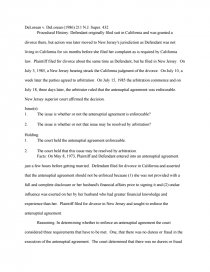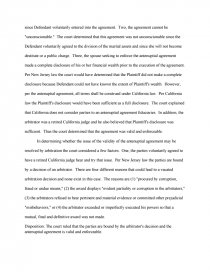Delorean V. Delorean Case
Essay by slyj0073 • February 20, 2014 • Essay • 638 Words (3 Pages) • 1,448 Views
DeLorean v. DeLorean (1986) 211 N.J. Super. 432
Procedural History: Defendant originally filed suit in California and was granted a divorce there, but action was later moved to New Jersey's jurisdiction as Defendant was not living in California for six months before she filed her complaint as is required by California law. Plaintiff filed for divorce about the same time as Defendant, but he filed in New Jersey. On July 3, 1985, a New Jersey hearing struck the California judgment of the divorce. On July 10, a week later the parties agreed to arbitration. On July 15, 1985 the arbitration commence and on July 18, three days later, the arbitrator ruled that the antenuptial agreement was enforceable. New Jersey superior court affirmed the decision.
Issue(s):
1. The issue is whether or not the antenuptial agreement is enforceable?
2. The issue is whether or not that issue may be resolved by arbitration?
Holding:
1. The court held the antenuptial agreement enforceable.
2. The court held that this issue may be resolved by arbitration.
Facts: On May 8, 1973, Plaintiff and Defendant entered into an antenuptial agreement just a few hours before getting married. Defendant filed for divorce in California and asserted that the antenuptial agreement should not be enforced because (1) she was not provided with a full and complete disclosure or her husband's financial affairs prior to signing it and (2) undue influence was exerted on her by her husband who had greater financial knowledge and experience than her. Plaintiff filed for divorce in New Jersey and sought to enforce the antenuptial agreement.
Reasoning: In determining whether to enforce an antenuptial agreement the court considered three requirements that have to be met. One, that there was no duress or fraud in the execution of the antenuptial agreement. The court determined that there was no duress or fraud since Defendant voluntarily entered into the agreement. Two, the agreement cannot be "unconscionable." The court determined that this agreement was not unconscionable since the Defendant voluntarily agreed to the division of the marital assets and since she will not become destitute or a public charge. Three, the spouse seeking to enforce the antenuptial agreement made a complete disclosure of his or her financial wealth prior
...
...

